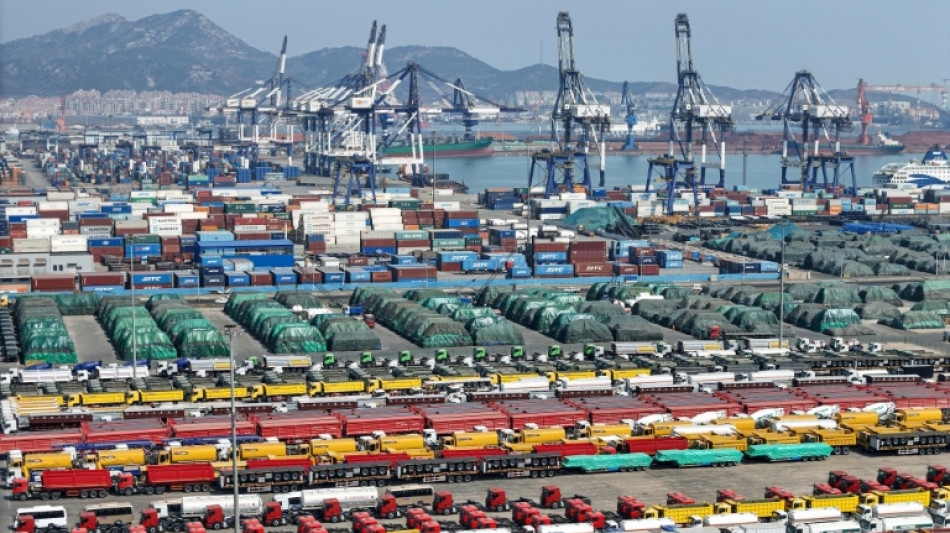
| RBGPF | 1.48% | 69.02 | $ | |
| JRI | -7.19% | 11.96 | $ | |
| SCS | -0.56% | 10.68 | $ | |
| CMSC | 0.13% | 22.29 | $ | |
| BCC | 0.85% | 95.44 | $ | |
| CMSD | 0.7% | 22.83 | $ | |
| RYCEF | -18.79% | 8.25 | $ | |
| NGG | -5.25% | 65.93 | $ | |
| RIO | -6.88% | 54.67 | $ | |
| RELX | -6.81% | 48.16 | $ | |
| BCE | 0.22% | 22.71 | $ | |
| GSK | -6.79% | 36.53 | $ | |
| VOD | -10.24% | 8.5 | $ | |
| AZN | -7.98% | 68.46 | $ | |
| BTI | -5.17% | 39.86 | $ | |
| BP | -10.43% | 28.38 | $ |

Trump tariffs offer opportunity for China
In unleashing global tariffs, President Donald Trump has vowed to remake the world to benefit US workers. One beneficiary could be the country he sees as the primary adversary -- China.
Asia's largest economy promptly slapped identical tariffs on the United States and said it would impose export controls on rare earth elements vital in consumer and medical technology.
But unlike during his first term, this time Trump is targeting not just China but the entire world -- including American allies that had increasingly joined Washington's firm line on Beijing.
Just days before Trump's "Liberation Day" tariffs announcement, China moved to revive stalled free-trade talks with Japan and South Korea, both treaty-bound US allies with deep-rooted skepticism about Beijing.
"If Trump's unilateralism continues, I expect Beijing to court these capitals more aggressively, positioning itself as the steadier economic anchor in the region," said Lizzi Lee, a fellow on the Chinese economy at the Asia Society Policy Institute's Center for China Analysis.
"And let's not forget the optics. China is very much framing Trump's tariffs as proof of US decline -- resorting to protectionism, bullying allies and retreating from global norms," she said.
Yun Sun, a senior fellow at the Stimson Center, said she had expected China to be "a little more chill" in response to Trump's tariffs but said Beijing did not appear as worried as during his first term.
"I think the Chinese see this more as opportunity and believe the US is actively undermining itself," she said.
"There are a number of aggrieved parties that had been solid and loyal allies of the US," she added. "Now their confidence in the approach that the US is taking around the world is -- I wouldn't say shattered -- but at least in doubt."
- Burying US opening to China -
To be sure, China will likely feel real pain from the US tariffs. It shipped more than $500 billion in goods to the United States last year, with the trade balance far in China's favor.
Critics of China hailed what they saw as a death knell for a former near-consensus in Washington on the value of integrating the Asian power into the global economy.
"The idea that Communist China could be a responsible member of an international trade regime -- the World Trade Organization -- which should be premised on equal and fair trade, is a joke," said Representative Chris Smith, a Republican who for decades has railed against Bill Clinton's 1994 delinking of China's trading privileges from human rights.
"Unlike previous presidents, President Trump fully understands the nature and scope of the problem -- and the existential threat posed by China -- and what needs to be done," Smith said.
Jacob Stokes, a senior fellow at the Center for a New American Security, noted that China still has a slew of issues with other countries, from territorial disputes with Japan, India and Southeast Asia to concerns in Europe over China's embrace of Russia in the Ukraine war.
"China has been adept at undermining its own positions, especially with its neighbors, through assertiveness and even aggression," Stokes said.
- Attention shifts from China -
But Stokes said that former president Joe Biden had been effective in forming coalitions with other countries to put pressure on China, on issues from access to fifth-generation internet networks to security.
"To the extent that Beijing was feeling a little bit isolated at the end of the Biden administration, I think that a lot of that pressure has come off as the locus of disruption is now clearly Washington," Stokes said.
While both Trump and Biden policymakers have identified China as the top US rival, Lee, of the Asia Society Policy Institute, said Trump fundamentally saw President Xi Jinping "not as a villain, but as a peer -- another strongman."
"For Trump, economic war isn't about economics or even the stock markets -- it's about the optics of domination and strength," Lee said.
"And that leaves just enough room for a pivot -- if Xi offers the kind of win Trump can brand."
P.Conti--IM



